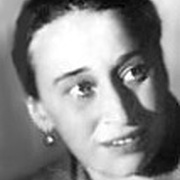Nadezhda Mandelstam (1899–1980)
Autor(a) de Hope Against Hope: A Memoir
About the Author
Séries
Obras de Nadezhda Mandelstam
Spomini 1 exemplar(es)
Contra la desesperanza 1 exemplar(es)
Associated Works
Etiquetado
Conhecimento Comum
- Nome padrão
- Mandelstam, Nadezhda
- Nome de batismo
- Мандельштам, Надежда Яковлевна
Mandelstam, Nadezhda Yakovlevna - Outros nomes
- Хазина, Надежда Яковлевна
Khazina, Nadezhda Yakovlevna (birth) - Data de nascimento
- 1899-10-31
- Data de falecimento
- 1980-12-29
- Local de enterro
- Kuntsevo Cemetery, Moscow, Russia
- Sexo
- female
- Nacionalidade
- Russian Empire
USSR - País (para mapa)
- Russia
- Local de nascimento
- Saratov, Russia
- Local de falecimento
- Moscow, Russia
- Locais de residência
- Saratov, Soviet Union
Kiev, Ukrainian SSR, Soviet Union
Moscow, Russian SFSR, Soviet Union
Cherdyn, Perm Oblast, Soviet Union
Voronezh, Soviet Union
Kalinin Region, Soviet Union (mostrar todas 9)
Tashkent, Uzbek SSR, Soviet Union
Cheboksar, Chuvashiya, Soviet Union
St. Petersburg, Russia - Ocupação
- writer
memoirist
autobiographer
Teacher of English - Relacionamentos
- Mandelstam, Osip (spouse)
Akhmatova, Anna (friend)
Pasternak, Boris (friend)
Gumilev, Lev (friend) - Organizações
- Chuvash Teacher's Training College
- Pequena biografia
- Nadezhda Khazina, born to a Russian Jewish family, studied art as a young woman. In 1921, she married poet Osip Mandelstam. After Osip was arrested during Stalin's purges and sent to the Gulag, where he died in 1938, Nadezhda Mandelstam was forced to move about the country constantly, changing jobs, in order to avoid being arrested herself. Having made it her mission in life to preserve and publish her husband's works, she had to memorize them to keep them safe from destruction. Years after Stalin's death, she was permitted to return to Moscow. During the years of her nomadic existence, Nadezhda Mandelstam earned a college degree and taught English in various provincial towns. She originally published her memoirs in the underground press or samizdat, and they were smuggled into the West. She finally received recognition for her own writing when she was in her sixties.
Membros
Resenhas
Listas
Prêmios
You May Also Like
Associated Authors
Estatísticas
- Obras
- 17
- Also by
- 4
- Membros
- 829
- Popularidade
- #30,792
- Avaliação
- 4.2
- Resenhas
- 16
- ISBNs
- 56
- Idiomas
- 7
- Favorito
- 4
















It is a memoir of these two specific people, yet so much more. It is full of great historical, sociological and psychological insight into the times. She clearly identifies the Revolution as a total overthrow of old values and their replacement by new. In the early days of the 1920s, there was widespread enthusiasm for this new project. Consider this passage in which she writes of the new regime: During this time, Osip's poetry went silent as he tried to find a vantage point from which to firmly approach and understand this new world. He was not unsympathetic to it, but he was unable to come to terms with its demand for absolute unanimity and lack of doubt, or to go silent. His poetry resumed in the later twenties, though he had an increasingly difficult time being published, and in 1934 was arrested for the first time.
Her description of society's reaction to the Stalin terror is the best I've ever read. There were few heroes who dared to openly challenge it. She writes, "I can testify that nobody I knew fought - all they did was to lie low. This was the most that people with a conscience could do - and even that required real courage." What most people did was to try to save themselves. If they did not become informers, they acted for the benefit of their neighbors who were. Nadezhda sees the terror as a natural outcome of the post-revolutionary value change, the discarding of humanism and faith in the new scientific certainty, and not some accidental anomoly: And she brightly analyzes the purpose and methods of the terror, the quotas of victims that must be met in increasing numbers until continuing the terror is no longer tenable: After Osip's arrest, a "miracle" occurred in that he was not shot or sent to a labor camp, but exiled from major cities. With his status as an exile, however, he and Nadezhda could hardly find work in the completely state-controlled economy, as their hiring by anyone could have led to the denouncement and arrest of anyone so "unvigilant" enough to hire an enemy of the people. So they were reduced to begging among their friends and literary circles until Osip's second arrest in 1937 and sudden death shortly thereafter.
Unlike most of her contemporaries even in the post-Stalin "thaw" of the sixties, Nadezhda decided not to keep quiet about her experiences. Writing this memoir was a triumph of individual will and moral strength refusing to be conquered and go silent. This stance was mirror of her husband Osip's. Reading this incredible book today can be a bit difficult due a couple of factors: the historical insularity and discursive nature of her writing. So many names are discussed that the non-expert in Soviet history and literature will not recognize, and the appendix of names in the back makes for essential flipping back and forth. The narrative of her and Osip's trials, meanwhile, is frequently broken up by these musings on larger societal issues, or stories about people they knew. For instance, shortly before Osip's final arrest they returned to the Moscow region, but after the narrative takes them there we wander off into sixty pages of discussions of what books they used to own, how Osip felt about Italy, poetic theory... and then the narrative story picks up where it was left.
I'll leave off with this hopeful conclusion of Nadezdha Mandelstam: … (mais)